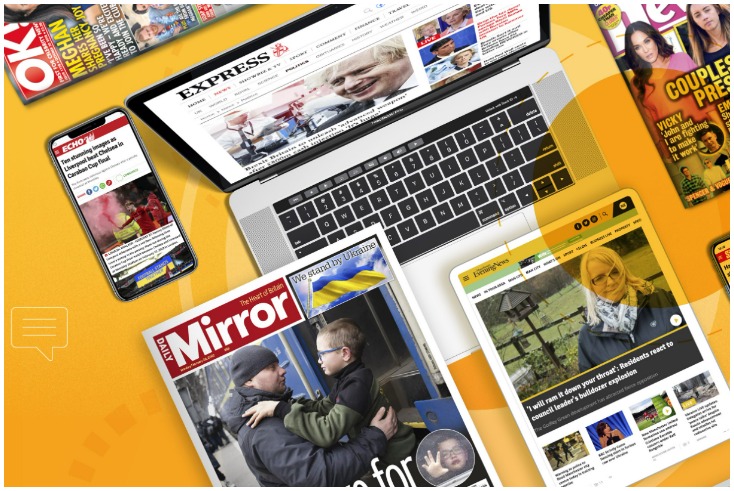Reach posts revenue decline but now has ‘clear path forward’

Reach, the UK’s largest publisher, posted a decline in revenue of 5.4% and a decline in profit of 9% in its 2023 financial results.
The revenue decline is, unlike for many other traditional publishers, being led by a more precipitous drop in digital than in print. Whereas print revenue declined marginally (2%) year on year to £438.8m, digital revenue fell 15% to £127.4m.
Print performance was buoyed by continued strong circulation (2% growth in revenue to £312.5m), despite a decline in print advertising of 12% to £76.6m.
The drop in digital revenue occurred primarily due to a 24% fall in open market programmatically driven advertising. Reach’s page views also declined 24% year on year. However, its average revenue per thousand users from digital page views increased 10%.
Analysis: ‘A reasonably optimistic outlook’
Shares of Reach were trading more than 11% higher following the financial results, which were better than anticipated, according to analysts.
“It’s a reasonably optimistic outlook,” said martech analyst Alex DeGroote in conversation with The Media Leader. “If you didn’t know about all of the bad stuff from last year, you wouldn’t really appreciate that the company was in difficulty.”
Reach did not provide any guidance on further redundancy or cost-cutting plans, nor did it signal any new profit warnings — both positives given the company’s relative financial struggles in 2023.
Whereas most other publishers are seeing gains in digital revenues while suffering continued, large losses in print revenues, the opposite is true for Reach. “The print side of the business is propping everything else up,” DeGroote said. “[Reach’s] ability to miraculously continue with price increases for print newspapers — those prices are sticking and it’s working in their favour.”
While Reach’s print business is also seeing declines in ad revenue, DeGroote noted that it is “declining at a manageable rate” that should allow the company more time to work on attracting more sustainable long-term digital revenue figures.
“You can’t honestly say their digital strategy has been a big success overall,” said DeGroote, noting however that the “jury is still out” on the company’s future capacity to become more digitally relevant.
Reach has pointed to Mantis, the company’s AI-powered contextual safety tool, as a way to drive stronger digital revenues by providing advertisers enhanced data and targeting capabilities. The publisher has also invested in studios to help produce more multimedia content to reach new audiences online.
“These guys could be survivors,” added DeGroote. “They have been survivors. Sometimes you think: ‘How is this company still so big?’ It’s just got lots of legacy businesses that are still generating good numbers. There’s nothing particularly exciting in here, but it keeps trundling on.”
Further results at a glance
“Throughout the year, our entire industry saw a fall in referral traffic from tech platforms and we were not immune from that,” commented Reach CEO Jim Mullen in a statement accompanying the financial report. “Facebook, one of our largest traffic referrers, has shifted away from news content and we have contended with numerous Google core algorithm updates, each one requiring us to pivot on how we deliver content to our audiences.”
The company, which was cash positive at the end of 2022 (with $25.4m), is also now in the negative, with net debt of £10.1m. That is despite delivering on its cost-cutting programme, which reduced operating costs by 5.7% on a like-for-like basis to £469.5m.
However, Mullen highlighted that the publisher had notably “gained clarity on two significant long-term uncertainties in pension funding and historical legal issues” — something that he said has significantly reduced the company’s obligations and given it a “clear path forward for the business”.
The “historical legal issues” include the end of Prince Harry’s lawsuit against the Mirror, through which the publisher agreed to pay damages amounting to £140,600 following a ruling that the Duke of Sussex’s phone was hacked “to a modest extent” throughout the 2000s. The judgement, Mullen said, “enables us to draw a line under these issues”.
Meanwhile, last year Reach successfully came to an agreement with the Mirror Group Newspapers pension trustees on the 2019 triennial valuation, as well as the 2022 pension review, providing clarity of the publisher’s funding obligations.
Tech experimentation
“The success of our strategy also came to the fore this year,” Mullen continued. “Despite macroeconomic pressures, we have continued to build a stronger digital business with an increasing portion of much higher yielding revenues, reducing our reliance on the open market. At the same time, we have expertly managed our print business, maintaining circulation revenues as well as delivering necessary cost and efficiency plans across the group.”
Reach’s yield performance and cost-cutting measures gave the company a “sustainable operating margin”, according to Mullen, of 17%.
Mullen also noted that the three “.com” websites launched by the Mirror, Express and Irish Star in 2023 were “regularly attracting” a combined audience of 1m per day. Further, Reach’s experimentation with AI took shape throughout last year, including a “carefully” controlled roll-out of AI use in over a dozen newsrooms. Press Gazette has previously reported on Reach titles’ use of AI to “rip” and reuse stories that have already appeared in other Reach publications.
Furthermore, Mullen highlighted the company’s first-party data capabilities ahead of Google’s continued deprecation of third-party cookies. This includes the continued development of its proprietary Mantis tool. Mullen said Reach “will be significantly ahead of the curve on this front, with 12.3m registered customers, of which approximately 4m are active over each four-week period, and advanced capability to effectively place advertising using contextual targeting”.




